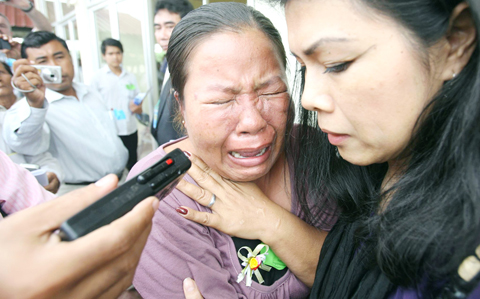The first Khmer Rouge commander to face a UN-backed tribunal was sentenced to 35 years in prison yesterday for overseeing 14,000 deaths in the 1970s, but he will serve about half that.
Former prison chief Kaing Guek Eav, known as “Comrade Duch,” received less than the maximum 40 years sought by the prosecution for his role in the regime blamed for 1.7 million deaths from 1975 to 1979.
Duch was found guilty of murder, torture, rape, crimes against humanity and other charges as chief of Tuol Sleng prison, a converted school known as S-21.

PHOTO: EPA
He betrayed no emotion as a judge read the verdict, which cut his sentence to 19 years for time already served. He could be released even earlier on parole if authorities believe he has been rehabilitated, the court said.
“We hoped this tribunal would strike hard at impunity, but if you can kill 14,000 people and serve only 19 years — 11 hours per life taken — what is that? It’s a joke,” said Theary Seng, who lost her father at S-21.
“My gut feeling is this has made the situation far worse for Cambodia,” she said. “It has taken a lot of faith out of the system and raised concerns of political interference.”
Duch had told the court he had no choice but to carry out orders. Prosecutors said he was “ideologically of the same mind” as the Khmer Rouge’s leaders and did nothing to stop rampant torture at his prison.
Some Cambodians wept after hearing the verdict, expressing outrage at the joint UN-Cambodian court, which has spent US$78.4 million in foreign donations to bring the first of five indicted Khmer Rouge officials to trial.
“There is no justice. I wanted life imprisonment for Duch,” said Hong Sovath, 47, sobbing.
Her father, a diplomat, was killed in the prison.

INVESTIGATION: The case is the latest instance of a DPP figure being implicated in an espionage network accused of allegedly leaking information to Chinese intelligence Democratic Progressive Party (DPP) member Ho Jen-chieh (何仁傑) was detained and held incommunicado yesterday on suspicion of spying for China during his tenure as assistant to then-minister of foreign affairs Joseph Wu (吳釗燮). The Taipei District Prosecutors’ Office said Ho was implicated during its investigation into alleged spying activities by former Presidential Office consultant Wu Shang-yu (吳尚雨). Prosecutors said there is reason to believe Ho breached the National Security Act (國家安全法) by leaking classified Ministry of Foreign Affairs information to Chinese intelligence. Following interrogation, prosecutors petitioned the Taipei District Court to detain Ho, citing concerns over potential collusion or tampering of evidence. The

‘FORM OF PROTEST’: The German Institute Taipei said it was ‘shocked’ to see Nazi symbolism used in connection with political aims as it condemned the incident Sung Chien-liang (宋建樑), who led efforts to recall Democratic Progressive Party (DPP) Legislator Lee Kun-cheng (李坤城), was released on bail of NT$80,000 yesterday amid an outcry over a Nazi armband he wore to questioning the night before. Sung arrived at the New Taipei City District Prosecutors’ Office for questioning in a recall petition forgery case on Tuesday night wearing a red armband bearing a swastika, carrying a copy of Adolf Hitler’s Mein Kampf and giving a Nazi salute. Sung left the building at 1:15am without the armband and apparently covering the book with a coat. This is a serious international scandal and Chinese

Seventy percent of middle and elementary schools now conduct English classes entirely in English, the Ministry of Education said, as it encourages schools nationwide to adopt this practice Minister of Education (MOE) Cheng Ying-yao (鄭英耀) is scheduled to present a report on the government’s bilingual education policy to the Legislative Yuan’s Education and Culture Committee today. The report would outline strategies aimed at expanding access to education, reducing regional disparities and improving talent cultivation. Implementation of bilingual education policies has varied across local governments, occasionally drawing public criticism. For example, some schools have required teachers of non-English subjects to pass English proficiency

TRADE: The premier pledged safeguards on ‘Made in Taiwan’ labeling, anti-dumping measures and stricter export controls to strengthen its position in trade talks Products labeled “made in Taiwan” must be genuinely made in Taiwan, Premier Cho Jung-tai (卓榮泰) said yesterday, vowing to enforce strict safeguards against “origin laundering” and initiate anti-dumping investigations to prevent China dumping its products in Taiwan. Cho made the remarks in a discussion session with representatives from industries in Kaohsiung. In response to the US government’s recent announcement of “reciprocal” tariffs on its trading partners, President William Lai (賴清德) and Cho last week began a series of consultations with industry leaders nationwide to gather feedback and address concerns. Taiwanese and US officials held a videoconference on Friday evening to discuss the